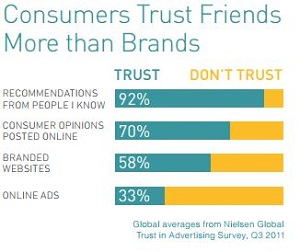Think about the last product you purchased. I don’t mean a consumable or something you picked up at the checkout line in the supermarket. I’m talking about a product that required careful deliberation. For me it was the BenQ RL2455HM Gaming Monitor. As an avid gamer and seasoned couch potato I was looking to enhance my gaming experience by buying a better screen to play video games on. The process I adopted in my search included talking to friends, reading reviews online, listening to expert advice, and comparing various options in my price range. While this process gave me a wide perspective about the products available, I was still unsure about my decision. However, a friend (let’s call him Chuck) referred me to the BenQ gaming monitor. He stated that the product was of very high quality, extremely durable, and fit within my price range. Chuck’s recommendation wasn’t the only factor that I took into account when I made my purchasing decision, but it was the most important one.
The reason I’m telling you this story is while some of the details I mentioned may only apply to me (including Chuck’s extensive knowledge of monitors), the process behind a consumer purchase is pretty similar. As human beings, we’re programmed to share our experiences with friends. And what’s more important is that this sharing or referral process plays a significant role in our purchasing behavior as consumers. This is the basis of referral marketing.
So let’s take a look at what referral marketing is, and why it’s a profitable marketing tactic.
What is Referral Marketing?
Referral marketing is defined as:
“A method of promoting products or services to new customers through referrals, usually word of mouth. Such referrals often happen spontaneously but businesses can influence this through appropriate strategies”
Put simply, referral marketing is when you get your customers to tell their friends about you.
As explained in this blog post, referral marketing is similar to marketing in general in that it’s an organic process. Referral marketing takes place regardless of a marketer’s involvement. The idea however, is to ensure that marketers deliberately influence and incentivize their customers to tell their friends about the awesome products they’ve purchased. Referring back to my previous example (no pun intended), Chuck’s referral of the BenQ gaming monitor was not motivated by any referral marketing initiative. He simply wanted to share information about the great product he purchased.
However, if Chuck were to receive an incentive for his referral like a 10 percent discount on his next purchase, it would be an example of a deliberate referral marketing initiative.
So why is it important for marketers to leverage referrals?
Why is Referral Marketing Important?
Consumers trust their friends more than the brands that advertise to them.
With an increase in online sharing and social networking, consumers now have newer ways in which they share, consume, and find information about brands. Marketers need to leverage this phenomenon to identify more customer advocates who are willing to share with their friends. In fact, personal recommendations are the primary driver of consumer purchase decisions at every stage of the purchase lifecycle for the majority of product categories and industries:

- 92% of respondents trusted referrals from friends they knew – Nielsen
- 77% of consumers are more likely to buy a new product when learning about it from friends or family – Nielsen
- 83% of consumers are willing to refer after a positive experience, yet only 29% actually do – Texas Tech
- People are 4x more likely to buy when recommended by a friend – Nielsen
- The lifetime value of a new referral customer is 16% higher – Wharton School of Business
Only 39 percent of marketers use referral marketing regularly, but 43 percent of those who do use it acquire more than 35 percent of their new customers with it – Gigaom Research
Remember: when your customers are happy, they are more inclined to refer their friends, when they refer their friends, you get more business. It’s a Win-Win-Win situation.
Now that we’ve established the value of referrals, how do marketers know if their referral programs are in fact successful? In my next post I’ll be highlighting the various characteristics of a successful referral program and some of the best practices.
Read More:
